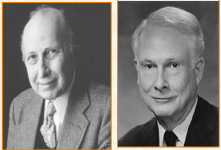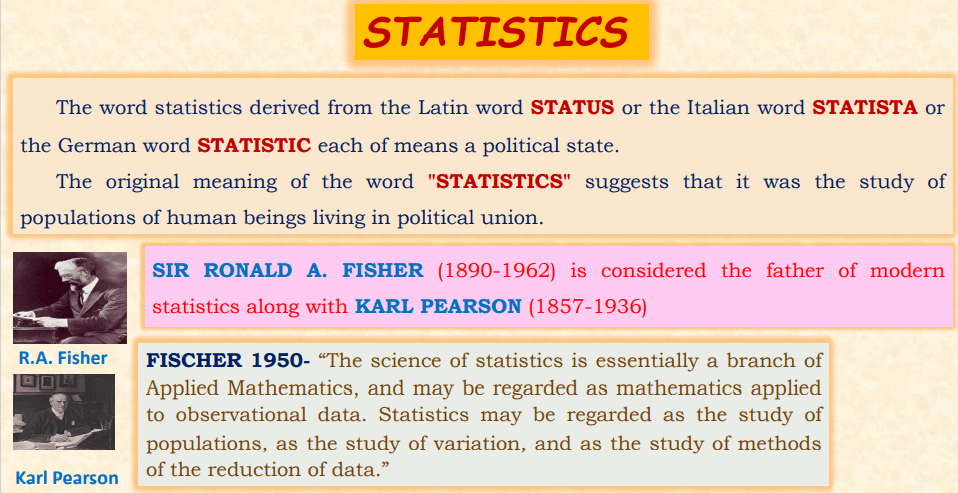What is Statistics?
Statistics is defined as the science of Collecting, Organizing, Summarizing, Presenting, Analyzing, and Interpreting the data as well as deriving valid conclusions and making reasonable decisions on the basis of this analysis.
The word statistics is derived from the Latin word STATUS or the Italian word STATISTA or the German word STATISTIC of means a political state.
The original meaning of the word “STATISTICS” suggests that it was the study of populations of human beings living in political unions.

SIR RONALD A. FISHER (1890-1962) is considered the father of modern
statistics along with KARL PEARSON (1857-1936)
FISCHER 1950- “The science of statistics is essentially a branch of Applied Mathematics and may be regarded as mathematics applied to observational data. Statistics may be regarded as the study of populations, as the study of variation, and as the study of methods of the reduction of data.”

SIR ARTHUR LYON BOWLEY, defined statistics as “Numerical statements of facts in any department of inquiry placed in relation to each other”.

CROXTON and COWDEN defined statistics as the science of collection, presentation, analysis, and interpretation of numerical data from logical analysis.

KENDALL AND STUART defined this is the branch of the
scientific method which deals with the data obtained by counting or measuring the properties of populations of natural phenomena.”

KRUSKAL and WALLIS defined this as concerned with the inferential process, in particular with the planning and analysis of experiments or surveys, with the nature of observational errors and sources of variability that obscure underlying patterns, and with the efficient summarizing of sets of data.”
Applications of statistics
- Actuarial science- To assess risk in the insurance and finance industries.
- Astrostatistics– To understand Astronomical data.
- Biostatistics– To study the biological phenomena and observations
- Business analytics- To develop new insights and understanding of business performance and opportunities
- Chemometrics- To measure chemical system or process to the state of the system.
- Demography- To study any kind of dynamic population, that changes over time or space.
- Econometrics- To study the economic theories and relationships.
- Environmental statistics- To study weather, climate, air and water quality.
- Forensic statistics- To study scientific evidence, such as DNA evidence, and the law.
- Geostatistics- To study the analysis of data from disciplines such as Petroleum
- Geology, Hydrogeology, Meteorology, Geochemistry and Geography.
- Psychometrics- To study applied educational and psychological measurement of knowledge, abilities, attitudes, and personality traits.
- Quality control- To study the influence of factors involved in manufacturing and production.
- Quantitative psychology – To explain the change mental processes and behaviors in humans.
